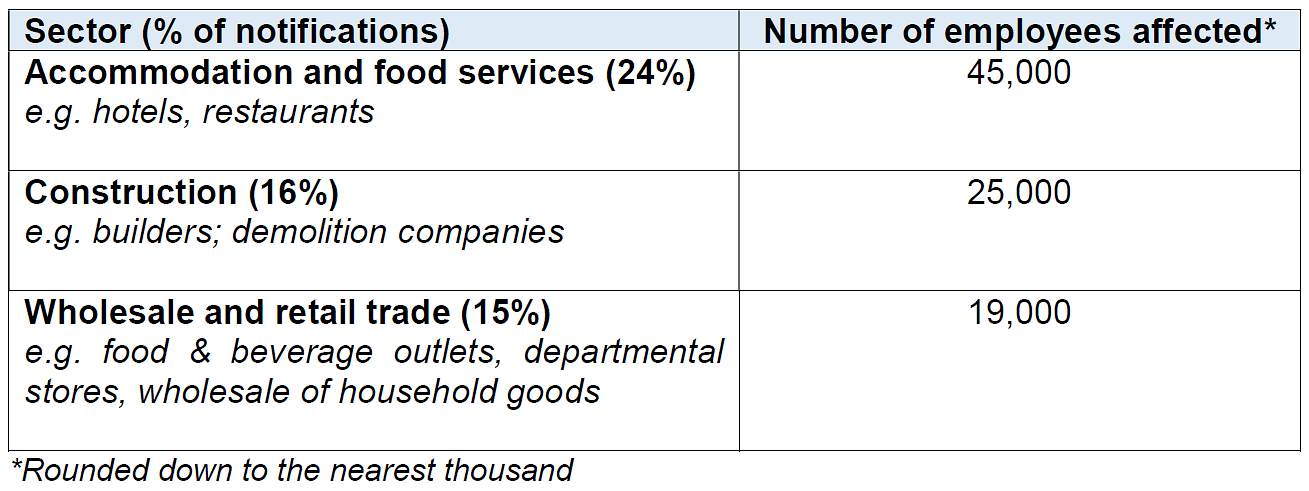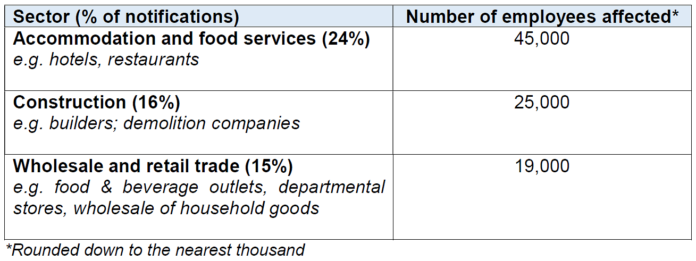SINGAPORE: The majority of employers in Singapore have been “reasonable and fair” when adopting cost-saving measures during the COVID-19 situation.
The findings were jointly released on Wednesday (Jun 24) by the Ministry of Manpower (MOM) and employment discrimination watchdog Tripartite Alliance for Fair and Progressive Employment Practices (TAFEP).
Since Mar 12, employers with at least 10 employees have been required to notify MOM if they implement cost-saving measures that affect the monthly salaries of their employee.
In the following three months, more than 4,800 employers did so, with more than 187,000 employees affected by their cost-saving measures.
READ: NTUC ‘realistic’ about tougher times ahead, will continue preserving and creating jobs: Ng Chee Meng
READ: National Jobs Council will open pathways to jobs amid COVID-19 pandemic: Josephine Teo
INTERVENTION FOR “EXCESSIVE” MEASURES
During this process, if an employer’s cost-saving measures appeared to be excessive in the notification submitted to MOM, TAFEP would step in to assess if the measures were fair and reasonable, said the release.
Of the 4,800 employers who notified MOM of their cost-cutting measures, TAFEP engaged about 700 employers with more than 33,000 affected workers.
“About 300 employers agreed to review their measures, including to provide more wage support or require employees to clear fewer days of annual leave,” said the release.
“The remaining employers were able to justify the necessity of their cost-saving measures for business survival,” it added.
READ: COVID-19: National Wages Council suggests management lead by example when cutting pay
READ: Employers that ‘disguise retrenchments’ may have Jobs Support Scheme, work pass privileges withdrawn: Josephine Teo
45,000 WORKERS FROM ACCOMMODATION AND FOOD SERVICES
According to the data from MOM and TAFEP, nearly one-quarter of the 187,000 employees affected by the cost-cutting measures were from the accommodation and food services.
The sector also made up 24 per cent of all mandatory cost-cutting notifications to MOM in the three months after Mar 12.
Another 16 per cent of the employers who had made notifications during that period were from the construction industry, while 15 per cent were from the wholesale and retail trade sector.

(Graphic: MOM/TAFEP)
The top three cost-saving measures implemented were no-pay leave, adjustments to monthly salary components and shorter work weeks.
Based on the notifications received, most employees saw their salaries reduced by up to 25 per cent because of the cost-saving measures.
POOR OR DELAYED COMMUNICATIONS
Separately, MOM has also been helping more than 600 individual employees who felt that the cost-saving measures implemented by their companies were unfair or unreasonable, said the release.
“This is understandable given the adjustments employees have had to make during this period in terms of their work and salary arrangements,” said MOM.
The most common issue raised was whether it was acceptable for employers to ask employees to consume annual leave or take no-pay leave, despite employers receiving support from the government, such as the jobs support scheme and foreign worker levy rebates.
“To manage cost pressures and conserve manpower for when they are most needed, the tripartite partners agreed that it is reasonable for employers to ask employees to tap on existing leave entitlements or even take some no-pay leave when business activity has been sharply reduced,” said the release.
“It is a shared responsibility and employees are encouraged to support their companies’ cost-saving measures to help the company tide through this difficult period, in order to avoid the worse alternative of retrenchment,” it added.
READ: Retrenchments and withdrawn job offers: Singapore’s labour market shows signs of COVID-19 strain
READ: COVID-19: More than 7,000 workers matched to new jobs under NTUC’s Job Security Council
So far, there has not been a case of an employer wilfully refusing to channel Government support funding to proper use, said the release.
The majority of complaints were found to have arisen from poor or delayed communications, with MOM’s interventions revealing that in 74 per cent of cases, employers did not communicate the measures well, or failed to explain the necessity for adopting the cost-saving measures, or both.
“At the start of the ‘circuit breaker’, some employers were also unsure of the quantum of support they would be receiving and how they should use the JSS payout, the release said.
After the ministry engaged employers, they were cooperative and prepared to review their pracrices, with employees also willing to accept the cost-saving measures to save their jobs.
“To get through this crisis and save jobs, everyone must come together and do their part,” said Mrs Roslyn Ten, general manager of TAFEP.
“Employers will need to be responsible in how they adopt cost-saving measures to keep their businesses afloat. Employers also need to be open and transparent with employees on the need for cost-saving measures, and how these are to be implemented,” she added.
READ: Some companies still hiring even as retrenchments rise by about 10% amid COVID-19 pandemic
READ: Government to roll out new measures to help companies adopt flexible work arrangements
Ms Christine Loh, director of employment standards enforcement at MOM, said that both employers and employees have to make sacrifices to prevent retrenchment and preserve jobs.
“MOM will investigate complaints and take actions against employers who do not treat employees fairly,” said Ms Loh.
BOOKMARK THIS: Our comprehensive coverage of the coronavirus outbreak and its developments
Download our app or subscribe to our Telegram channel for the latest updates on the coronavirus outbreak: https://cna.asia/telegram





